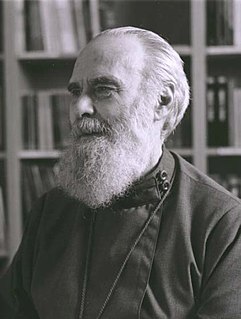A Quote by Thomas Paine
We ought therefore to suspect that a great mass of information respecting the Bible, and the introduction of it into the world, has been suppressed by the united tyranny of Church and State, for the purpose of keeping people in ignorance, and which ought to be known.
Related Quotes
It seems to me, and I am personally convinced, that the Church must never speak from a position of strength. [These are shocking words.] It ought not to be one of the forces influencing this or that state. The Church ought to be, if you will, just as powerless as God himself, which does not coerce but which calls and unveils the beauty and the truth of things without imposing them. As soon as the Church begins to exercise power, it loses its most profound characteristic which is divine love [i.e.] the understanding of those it is called to save and not to smash.
The Bible was written between 3,000 and 2,000 years ago, and it's filled with the knowledge that people had in that period of time, some of which you and I rejected long ago. The Bible says that women are property, that homosexuals ought to be put to death, that anybody who worships a false God ought to be executed, that a child that talks back to his parents ought to be stoned at the gates of the city. Those ideas are absurd.
The divorce between Church and State ought to be absolute. It ought to be so absolute that no Church property anywhere, in any state or in the nation, should be exempt from equal taxation; for if you exempt the property of any church organization, to that extent you impose a tax upon the whole community.
The [UN Security Council] P5 ought to be dissuaded from using their veto power, which can paralyze the United Nations. The country blocking action ought to have to explain its decision and propose an alternative solution. It has been suggested that a veto only becomes effective if the vetoing state has the support of two or three other permanent members.
The art of war is at once comprehensive and complicated; ... it demands much previous study; and ... the possession of it, in its most improved and perfect state, is always a great moment to the security of a nation. This, therefore, ought to be a serious care of every government; and for this purpose, an academy, where a regular course of instruction is given, is an obvious expedient, which different nations have successfully employed.
Every one ought to study the Bible with two ends in view: his own growth in knowledge and grace, and passing it on to others. We ought to have four ears,- two for ourselves, and two for other people. My Bible is worth a good deal to me because I have so many passages marked that, if I am called upon to speak at any time, I am ready. We ought to be prepared to pass around heavenly thoughts and truths, just as we do the coin of the realm.
A State, in idea, is the opposite of a Church. A State regards classes, and not individuals; and it estimates classes, not by internal merit, but external accidents, as property, birth, etc. But a church does the reverse of this, and disregards all external accidents, and looks at men as individual persons, allowing no gradations of ranks, but such as greater or less wisdom, learning, and holiness ought to confer. A Church is, therefore, in idea, the only pure democracy.
Each man's private conscience ought to be a nice little self-registering thermometer: he ought to carry his moral code incorruptibly and explicitly within himself, and not care what the world thinks. The mass of human beings, however, are not made that way; and many people have been saved from crime or sin by the simple dislike of doing things they would not like to confess.
Living in the now is freedom from all problems connected with time. You ought to remember that sentence, you ought to memorize it, and ought to take it out, you ought to practice it, you ought to apply it. And most of all, you ought to rejoice in it because you have just heard how not to be wretched, miserable you any more but to be a brand new, and forever brand new man or woman.
Curiosity in children ... is but an appetite after knowledge and therefore ought to be encouraged in them, not only as a good sign, but as the great instrument nature has provided to remove that ignorance they were born with and which, without this busy inquisitiveness, will make them dull and useless creatures.





































